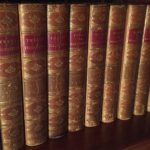I want to register a dissent from the usual “summer reading” recommendation of novels, the “beach reads” of light romances, mysteries, thrillers, or comic fiction. Far be it from me to condemn such reading. In past columns here, I have recommended science fiction, historical novels, and the works of P.G. Wodehouse. But it seems to me that summer—a time of lounging in a shaded hammock between two trees, or under a beach umbrella—is a great time for bite-sized nonfiction. I mean the reading of essays.
The word “essay” in English does not only mean (as the Oxford English Dictionary puts it) “a composition of moderate length on any particular subject.” In fact, that is the OED’s eighth definition of the noun. Its other meanings give us a taste of what kind of writing an essay is. It is a trial, an attempt, an experiment, a testing. This is what good essays do; they try out an argument, attempt an explanation, experiment with an idea, test the value of an observation.
The use of “essay” for a piece of writing seems to have originated at the end of the sixteenth century with Francis Bacon, who borrowed it from the French Essais of Montaigne, who in turn is credited with originating the literary form. I will let someone more familiar with Montaigne speak of what his thought has to teach us—my friends Benjamin and Jenna Storey can tell you—but I can say that his essays are personal yet detached, passionate but skeptical, and learned without being ponderous.
Bacon, for his part, brought similar powers of concentration to his own essays, and he too was capable of keen insights. Here he is, beginning his essay “Of Empire”:
Start your day with Public Discourse
Sign up and get our daily essays sent straight to your inbox.It is a miserable state of mind to have few things to desire, and many things to fear; and yet that commonly is the case of kings, who, being at the highest, want matter of desire, which makes their minds more languishing; and have many representations of perils and shadows, which makes their minds the less clear.
With the advent of long-form journalism in the nineteenth century, in magazines such as the Edinburgh Review in Britain and the North American Review in the United States, the essay became a more common form of writing, sometimes in the form of the book review, also then a new thing. The results were not always the sort of thing I would recommend for summer reading. Take Thomas Babington Macaulay, for instance, a historian so enamored of detail that his massive five-volume History of England from the Accession of James II, unfinished at his death in 1859, covers only seventeen years of his country’s history. Macaulay’s essays, not surprisingly, are often worthy but similarly weighty, sometimes running to scores of pages on subjects such as Machiavelli, Bacon, Bunyan, and Johnson. Not for the summer hammock, thanks.
Nor is Ralph Waldo Emerson, perhaps America’s most acclaimed essayist of the nineteenth century. In my own humble view, rather than “Self-Reliance,” his most famous essay, I should think “Self-Importance” a more accurate description of the Sage of Concord’s thought. I’d be inclined to pitch a volume of Emerson into the surf after an hour or two, were I unwise enough to take him to the beach.
No, instead give me Charles Lamb, whose charming “A Dissertation upon Roast Pig” was once widely anthologized. Or Mark Twain, whose devastating takedown in “The Literary Offenses of Fenimore Cooper” should have been warning enough that I should not read Cooper’s ghastly The Last of the Mohicans. Twain’s aim is as unerring as, well, Natty Bumppo’s.
Or try the genial, perspicacious Robert Louis Stevenson, in an essay such as “The Character of Dogs”:
The absence of the power of speech confines the dog in the development of his intellect. It hinders him from many speculations, for words are the beginning of metaphysic. At the same blow it saves him from many superstitions, and his silence has won for him a higher name for virtue than his conduct justifies. The faults of the dog are many. He is vainer than man, singularly greedy of notice, singularly intolerant of ridicule, suspicious like the deaf, jealous to the degree of frenzy, and radically devoid of truth. The day of an intelligent small dog is passed in the manufacture and the laborious communication of falsehood; he lies with his tail, he lies with his eye, he lies with his protesting paw; and when he rattles his dish or scratches at the door his purpose is other than appears. But he has some apology to offer for the vice. . . .
The twentieth century, with its total wars and total tyrannies, gave us the man or woman of letters whose interests were often political. George Orwell, familiar to countless people who were told to read 1984 or Animal Farm in school, was truly in his element as an essayist. His nonsense detector was turned up to full strength in pieces like “Notes on Nationalism,” where he could report a folly and toss off a sentence like this: “One has to belong to the intelligentsia to believe things like that: no ordinary man could be such a fool.” But he could also write knowing critical appreciations of Swift, Kipling, or Wodehouse. And I wish I could find more essays by Dorothy L. Sayers, whose slender 1946 volume Unpopular Opinions is full of small delights, including a brief essay titled “A Vote of Thanks to Cyrus” that lays waste to much of “critical” biblical scholarship.
There are others I could name if I cared to go on, such as Saul Bellow and Paul Fussell, both of whom could cut an acerbic little jewel of an essay at their best. But I will here bid au revoir to Public Discourse, which will be on a publishing hiatus for the week following Independence Day. Time now to stretch out with some small provocation of thought. See you again next month.














